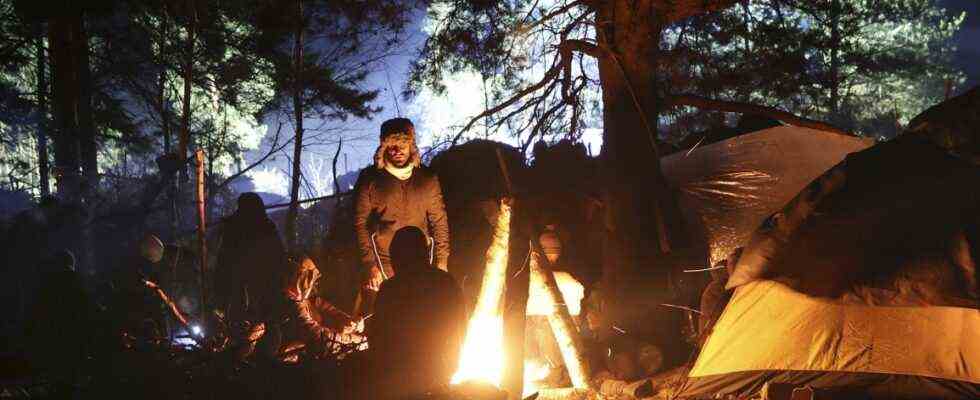The refugee crisis at the EU borders with Poland and Lithuania is worsening. Poland’s border guards announced over the weekend about violent attempts by migrants to cross the border from Belarus. There were also reports on the increasing use of Belarusian units and the preparations for the construction of a winter camp on the Belarusian side. Migrants and refugees have also been equipped with metal cutters or tear gas in order to enable them to storm the border more widely. Poland’s Prime Minister Mateusz Morawiecki said that there were discussions with Lithuania and Latvia about calling on NATO assistance under Article 4 of the NATO Treaty.
Polish human rights activists also describe Belarusian attempts to force migrants to use violence against Polish officials. Belarusian opposition officials also report on further migrants being transported from the Belarusian capital Minsk to the border.
Poland’s border guards reported on Sunday that there had been 223 attempts to illegally cross the border the day before. Regulations for leaving Polish territory were issued 77 times, in plain English: Refugees who had managed to cross the border were pushed back to Belarusian territory in pushbacks. This practice is forbidden under international law, but was legalized in Poland with a law that came into force on October 26th.
Polish units were blinded with lasers and strobe lights
There is said to have been a dramatic breakthrough attempt on Saturday night: Around 100 migrants and refugees tried to cross the border illegally, according to the Polish side. Belarusian units helped them cut through the border fences and blinded Polish units with lasers and strobe lights. Were on Twitter Video recordings published to show the action. The migrants also used tear gas, which the Belarusians had made available to them, in the attempt to break through.
The aid network Granica, which consists of 14 Polish human rights groups, works directly behind the restricted area and has spoken to hundreds of migrants who initially managed to overcome the border. Granica confirmed on Sunday that it was receiving “more and more disturbing information about attempts to coerce migrants into using force against Polish officials. Migrants refuse to take part in such provocations”.
A Polish border guard spokeswoman estimated the number of refugees staying at the border village Kuźnica on the Belarusian side at 1000. Thousands more people were waiting at other points on the border. Lithuania’s border guards reported on Saturday about 70 migrants who tried to cross the border with Lithuania: They reported to Lithuanian officials that Belarusian units had brought them from the Polish border in military trucks to the border area with Lithuania.
The hitherto provisional camp of the migrants will be made winter-proof
According to the Belarusian ex-diplomat Pavel Latuschka, in the border town of Brest, for example, the city’s largest hotel, the Intourist, is full of migrants. The Internet information service Nexta TV published pictures that, according to Belarusian journalists, show refugees in Minsk who were loaded onto buses on Sunday to take them to the border.
There, the border guards and the Belarusian army are apparently preparing for a long continuation of the border crisis. The Belarusian journalist Tadeusz Giczan published pictures that, according to him, show how Belarusian soldiers and firefighters at Kuźnica begin on Saturday to expand the hitherto provisional camp for migrants. Dictator Lukashenko had “ordered an electricity generator and military tents to be delivered to prepare for winter”. The Polish Interior Ministry confirmed the construction, adding that trucks were bringing construction materials to the border.
Poland, for its part, has hosted ten construction specialists from the Royal Engineers of the British Army since November 12th. The British engineers, who are housed with US troops in the town of Orzysz in north-eastern Poland, are to “explore how we can provide engineering support in view of the ongoing situation at the border,” said the British Ministry of Defense.
Journalists should be allowed to travel to the border area again from the end of November
Civil aid workers, journalists and international observers are prohibited from entering the border area in Poland. The underlying state of emergency expires at the end of November and Interior Minister Mariusz Kamiński is to be replaced by a border protection law that “de facto extends what is available today,” said the minister on the radio station RMF FM on Saturday. Parliament should already discuss the draft law on Tuesday. According to the minister, the draft stipulates that at least some Polish journalists will be allowed to travel to the border area again from the end of November, but only with individual approval by the border guards. “All broadcasters and editorial offices that have an all-Polish reach will be able to take advantage of these opportunities.”
For most migrants, the circumstances are dramatic given the temperatures that are often just above freezing, even during the day. Poland’s authorities announced on Saturday that they had found the body of a young Syrian at the border. Belarusian oppositionist Franak Viacorka called on the United Nations to “send a humanitarian mission to Belarus before the crisis turns into a real disaster”.
According to the Polish aid network Granica, the UN refugee agency is already informing migrants in Belarus that they can apply for asylum locally or return home voluntarily. On the Belarusian side, however, “a professional disinformation campaign” is taking place, according to Granica: Belarusians distributed forms suggesting that migrants would have the opportunity to settle in Poland or Germany. The relief agency is demanding “a humanitarian bridge” from the Polish government to take in the refugees who have persevered in the autumn cold – this is “the only way to de-escalate the violence”.

